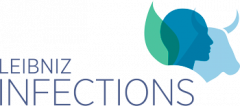
Leibniz Research Alliance INFECTIONS - Symposium “Antimicrobial resistance: The silent pandemic”
Location: Leibniz-Institut für Analytische Wissenschaften - ISAS - e.V., Dortmund, Germany
Date: 10-11 March 2025
Registration: Click here
PROGRAMM
|
1st Day | Monday, 10 March 2025 |
|
|
09.30 |
Registration |
|
10.30 |
Opening by Ulrich Schaible (speaker of LRA INFECTIONS, RC Borstel, Germany) |
|
10.40 |
Welcome address by tbn (ISAS, Dortmund, Germany) |
|
10.50 |
Welcome address by tbn |
|
Session I: Drivers of AMR: overuse, underuse, abuse, stewardship |
|
|
11.00 |
Keynote: Till Baernighausen (Heidelberg University, Germany) |
|
11.40 |
Lena Merkel (BNITM/GIGA, Germany) |
|
11.55 |
Christina Hölzel (Kiel University, Germany) |
|
12.20 |
Lunch & Coffee |
|
13.20 |
Hans-Peter Grossart (IGB, Germany) |
|
13.45 |
Denise Dekker (BNITM, Hamburg, Germany) |
|
14.10 |
Sahar Saeedi Moghaddam (IfW Kiel, Germany) Drivers of Antimicrobial Resistance: Economic Inequality, Corruption and Access to Antibiotics in 204 Countries & Territories |
|
14.20 |
Bernd-Alois Tenhagen (BfR Berlin, Germany) |
|
14.45 |
Coffee |
|
Session II: Evolution of AMR mechanisms |
|
|
15.15 |
Keynote: Michaela Lackner (University of Innsbruck, Austria) Unraveling Azole Resistance in Fungal Pathogens: Insights into Mechanisms and Implications for One Health |
|
15.55 |
Claire Taylor (RCB, Germany) |
|
16.10 |
Margo Diricks (RCB, Germany) Evolution of antibiotic resistance in Mycobacterium abscessus isolated from cystic fibrosis patients |
|
16.35 |
Break |
|
16.55 |
Baban Kolte (DSMZ, Germany) |
|
17.10 |
Ulrich Nübel (DSMZ, Germany) |
|
17.35 |
Matthias Merker (RCB, Germany) |
|
18.00 |
Social get-together & dinner |
|
19.00 |
Poster session & Meet the Speakers |
|
21:00 |
End of today’s program |
|
2st Day | Tuesday, 11 March 2025 |
|
|
|
Session III: Epidemiology and ecology of AMR transmission and AMR detection |
|
09.00 |
Keynote: Stefan Schwarz (FU Berlin, Germany) The role of mobile genetic elements in the dissemination of oxazolidinone resistance genes |
|
09.40 |
Thomas Berendonk (TU Dresden, Germany) |
|
10.05 |
Megarsa Bedasa Jaleta (ATB, Germany) Tracking antimicrobial resistance genes in weaner pigs: the abundance and mitigation |
|
10.20 |
Anja Silge (IPHT, Jena, Germany) |
|
10.45 |
Coffee |
|
11.15 |
Pau De Yebra Rodó (IGB/IZW, Germany) |
|
11.30 |
Doreen Werner (ZALF/DSMZ, Germany) (tbc) |
|
11.45 |
Lisa Eichler (IOER, Germany) |
|
12.10 |
Jan Buer (UK Essen) New Challenges in Clinical Infectious Diseases |
|
12.35 |
Lunch |
|
|
Session IV: Empty Chair Panel discussion: Policy strategies to overcome the global AMR crisis |
|
13.35 |
Keynote tbn |
|
14.15 |
3‘ Pitch Talks by |
|
14.30 |
|
|
15.55 |
Wrap-up, lessons learned |
|
16.30 |
Farewell: End of Symposium |
REGISTRATION
Registration is free of charge. Participants are expected to meet their own accomodation and travel expenses.
ADDRESS
Adresse des Veranstaltungsortes
CONTACT
Do you have any further questions? Please contact:
Dr. Susanne Pätzold
Research Center Borstel, Leibniz Lung Center (FZB)
T 04537 188 5840
spaetzold@fz-borstel.de
Britta Weller
Research Center Borstel, Leibniz Lung Center (FZB)
T 04537 188 2870
bweller@fz-borstel.de
